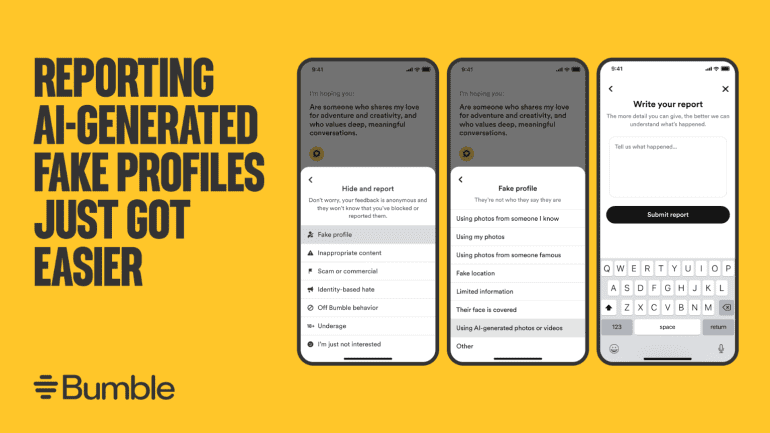- Bumble introduces reporting for AI-generated profiles.
- Users can now flag profiles suspected of using AI photos or videos.
- Initiative aims to combat deception and ensure authenticity.
- Vice President Risa Stein emphasizes safety and trust in dating.
- Bumble’s “Deception Detector” reduces spam and fake profiles.
- Founder Whitney Wolfe Herd discusses AI’s future in dating.
Main AI News:
Bumble users now have a powerful tool to uphold authenticity on the dating platform: the ability to report profiles suspected of using AI-generated photos. Recently introduced, this feature empowers users to flag profiles under the category “Fake profile,” with a specific option to report profiles for “Using AI-generated photos or videos.” This initiative by Bumble responds to a growing concern within the online dating community regarding the prevalence of AI-generated images, often employed for deceptive practices like catfishing.
Risa Stein, Vice President of Product at Bumble, emphasized the critical importance of maintaining a trustworthy dating environment. She stated, “An essential aspect of fostering meaningful connections is eliminating any elements that are misleading or potentially harmful.” Stein highlighted Bumble’s ongoing commitment to enhancing user safety through continuous technological advancements.
The introduction of this reporting feature aligns with Bumble’s broader strategy to combat the misuse of AI technology in online dating. It aims to deter individuals from creating misleading or fraudulent profiles, thereby fostering a more secure and authentic community. Stein underscored that this initiative is part of Bumble’s proactive approach to improving safety measures and ensuring a positive user experience.
In addition to the new reporting option, Bumble recently launched the “Deception Detector,” an innovative AI tool that combines machine learning with human moderation to identify and remove fake profiles, spammers, and scammers. Since its introduction earlier this year, Bumble has reported a significant decrease in member complaints related to spam, scams, and fraudulent profiles.
Despite these efforts to combat AI-generated profiles, Whitney Wolfe Herd, Bumble’s founder, envisions broader applications for AI in the future of online dating. In a recent interview, she hinted at possibilities such as AI-powered “dating concierges” that could manage dating interactions on behalf of users, potentially revolutionizing the online dating experience.
Overall, Bumble’s proactive stance against AI-generated profiles reflects its commitment to maintaining a safe, authentic, and enjoyable environment for its users. As technology continues to evolve, Bumble remains dedicated to leveraging innovation to enhance user security and trust within the online dating landscape.
Conclusion:
Bumble’s introduction of AI detection tools for identifying and reporting AI-generated profiles marks a significant step in maintaining authenticity and trust within the online dating market. By empowering users to flag suspicious profiles and implementing advanced AI technologies like the “Deception Detector,” Bumble not only enhances user safety but also sets a precedent for other platforms to adopt similar measures. This proactive approach underscores Bumble’s commitment to fostering genuine connections and combating deceptive practices, thereby shaping a safer environment for online daters.

